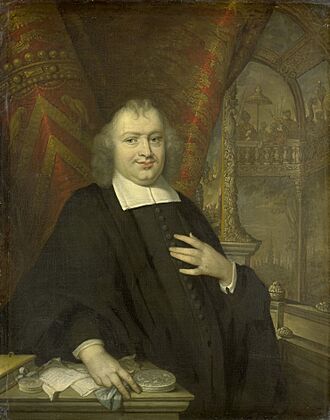Gaspar Fagel facts for kids
Quick facts for kids
Gaspar Fagel
|
|
|---|---|

Portrait by Johannes Vollevens
|
|
| Grand Pensionary of Holland | |
| In office 20 August 1672 – 5 December 1688 |
|
| Preceded by | Johan de Witt |
| Succeeded by | Michiel ten Hove |
| Personal details | |
| Born | 25 January 1634 The Hague, Dutch Republic |
| Died | 15 December 1688 (aged 54) The Hague, Dutch Republic |
| Resting place | Grote Kerk, The Hague |
Gaspar Fagel (born January 25, 1634 – died December 15, 1688) was an important Dutch politician. He was also a skilled lawyer and diplomat. Fagel is best known for working closely with William III, Prince of Orange. He helped William during the English Revolution of 1688.
Early Life and Career
Gaspar Fagel was born into a well-known and influential family. We do not know much about his early years. In 1663, he became the Pensionary of Haarlem. This meant he was a key representative for the city. As Pensionary, he also served as a member of the States of Holland. The States of Holland was the main governing body for the province of Holland.
Fagel's Political Journey
In 1667, Fagel joined other important leaders like Johan de Witt. They signed the Perpetual Edict. This was an agreement to remove the office of Stadtholder in Holland. A Stadtholder was a powerful leader, like a governor or military commander. Around the same time, most provinces in the States-General (the Dutch Republic's main government) agreed. They decided that the Stadtholder's job could not be held by the captain general.
In 1670, Fagel became the Secretary of the States-General. This was a very important position. In 1672, Johan de Witt resigned and was later murdered. After this, Fagel became the Grand Pensionary. This was the most powerful political job in Holland. He was known for being honest and strong. He bravely fought against the attempts of Louis XIV of France to harm his country. Fagel also strongly supported William III, Prince of Orange. He believed William should become the King of England.
Important Letters and Influence
William III often used letters from Fagel to communicate. These letters helped to assure English Nonconformists, also called dissenters. They were told they would be allowed to practice their religion freely. Some of these letters were written by Fagel as the Pensionary of Holland. One famous open letter from 1687 criticized King James II's religious policies. Other letters seemed to be written at William's request.
In 1687, a Scottish lawyer named James Stewart contacted some Dutch friends. Stewart supported changing certain laws, like the Test Acts. This information reached Fagel, who then wrote a response.
In early 1688, this letter became very popular in England. It promised religious tolerance for dissenters. However, it did not require them to support repealing all laws. Many dissenters felt that certain laws were vital to protect the Protestant faith. Fagel confirmed that the Dutch would only support softening some laws if: "...those Laws remain still in their full vigour by which the Roman Catholics are shut out of both Houses of Parliament, and out of all public employment; Ecclesiastical, Civil and Military: as likewise all those others, which confirm the Protestant Religion and which secures it against all the attempts of the Roman Catholic."
These letters helped convince the English Parliament. They showed that William III would support their plans for new laws. This led to the creation of the Bill of Rights of 1689. This document greatly shaped England's future.
 | Ernest Everett Just |
 | Mary Jackson |
 | Emmett Chappelle |
 | Marie Maynard Daly |

